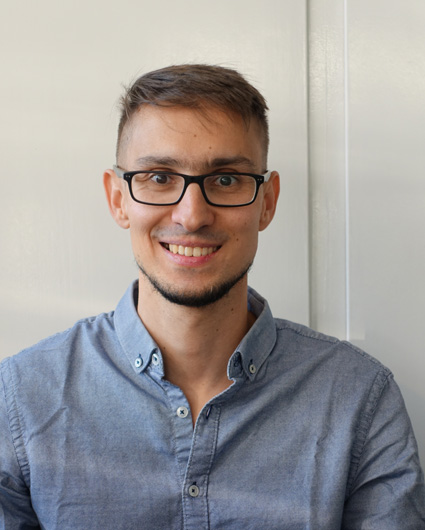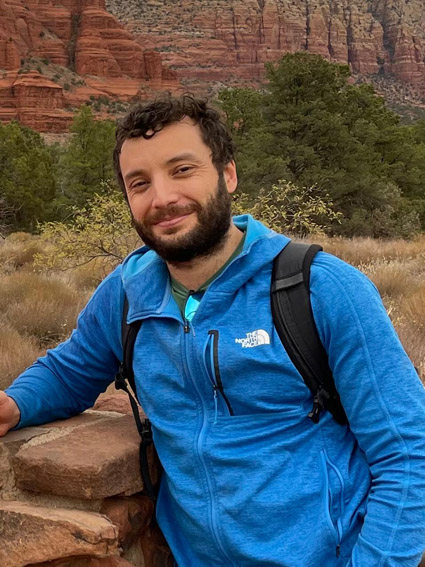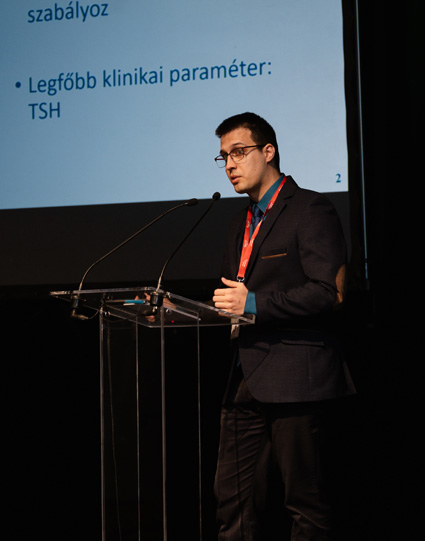János Bolyai Research Scholarship 2025: Three winners from KOKI
Our three winners are László Biró, Márton Rózsa, and Richárd Sinkó. Their achievements to date are recognized and rewarded with scholarships, for which we offer our heartfelt congratulations.
A successful present is worth more than even the most glorious past! I rediscovered this great truth after spending nearly four hours fruitlessly trying to compile a list of our institute's award winners from the various lists of winners found on the internet. I did not succeed. We must therefore stick to the inaccurate but true statement that KOKI has had at least forty winning applications to date. For a competition founded in 1997, this is by no means a bad result on an annual average, and the five winners in 2003 can certainly be considered a peak performance, given the number of KOKI researchers and the age limit for the scholarship.
It is also worth mentioning that this year, for the first time according to my inaccurate statistics, we have three winners: László Biró (BL), Márton Rózsa (RM), and Richárd Sinkó (SR). Their achievements to date are reflected in and rewarded by the scholarships they have won, for which we congratulate them wholeheartedly. But what now?
- We are already past the first half of the year, which ended really well for all three of you. Or is winning the Bolyai Research Scholarship just the latest in a long line of successes?
 BL
BL
- This year has been particularly successful for me: six of my articles have been accepted, four of which have already been published, and the remaining two are in the process of being published. These are milestones not only in terms of quantity but also quality: years of work, new methodological solutions, and strong collaborations have paid off. This has been my most successful year in terms of both awards and publications. Many years of work have come to fruition.
SR
- To my knowledge, hundreds of people submit this application every year and roughly one in five wins, so I expected serious competition. That's why I was particularly pleased to receive the good news. What's more, we succeeded with our Human Onion Project, which continues to be a fruitful collaboration. The results of the project so far have already earned me two youth awards from professional societies (MEAT and ETA) and this year's Bárány Róbert Award. However, this scholarship is a vote of confidence in the work planned for the coming years and provides an opportunity to continue, which I am happy to seize.RM
- The first half of the year was very busy. We worked hard to complete our projects at the Allen Institute, while I prepared the applications necessary for setting up the laboratory. Now that I've moved back home, we've been able to launch the Neural Diversity Research Group at KOKI, and I've also received the Bolyai Scholarship, which gives me even more momentum for the coming period. This is a real milestone for me: I can start building the research environment in which we will be working in the coming years.
- What do you think about the recognition of this scholarship and the opportunities it offers?
BL
- It is a great honor and a great pleasure to have won it. The scholarship not only gives me recognition, but also provides the financial conditions to allow me to devote my full attention to my scientific work.
SR
- The domestic application system has undergone significant changes in the last two years, and without the PD OTKA, researchers like me who have recently completed their PhDs did not have many opportunities this year, unless they were aiming for greater achievements. I believe that the Bolyai scholarship is a very important step on the ladder of applications, and it is no coincidence that hundreds of people apply for it every year.
Although it does not provide research funding, I was very happy to receive the scholarship. People live on money, and researchers live on public money, so this is always a sensitive issue. It is very sad when talented people abandon their good ideas and topics because they simply cannot afford to continue their research. A scholarship like this takes a lot of pressure off both the scholarship recipient and the lab.
 RM
RM
- The Bolyai Scholarship is highly prestigious in the Hungarian scientific community, and many people encouraged me to apply as soon as possible. It is extremely competitive, so it is a great honor to have won it.
- Why did you apply for the Bolyai Scholarship now? Did someone bring it to your attention?
RM
- While I was working abroad, I didn't have the opportunity to apply. Now that I'm back home, the Bolyai Scholarship came at the best possible time for a new start. If I hadn't been successful this year, I would definitely have applied again next year.
SR
- After obtaining my degree, I kept a keen eye out for any kind of grant opportunity. Many new ideas, mainly translational ones, emerged in the group, and I wanted to play a bigger role in advancing and developing them so that they would not have to be sacrificed. My academic performance this year made it possible for me to apply, so the time had come. I wanted to start small, so I kept my eye on this scholarship.
BL
- I saw that now was the best chance for success: I applied with recently published articles that provided a strong CV background and a mature, well-defined research plan. Laci Acsády specifically encouraged me to apply, for which I am very grateful. The timing was also favorable: our preliminary data fit the objectives of the call perfectly.
- Is there a specific goal that you definitely want to achieve during the scholarship period?
RM
- The most important goal is to get the lab up and running. The next few years will be crucial for me and for those who will join us. I would like to involve the students, start the first experiments, and develop research directions that will soon make our group visible in the international scientific community. I am also very much looking forward to starting new collaborations and thinking together with other research groups.
SR
- During the three-year period, we would like to implement a new application of the hair follicle project, which is the examination of a group of patients with subclinical hypothyroidism. Of course, this requires further assistance from our clinical partners, and we are delighted that this is still a thriving collaboration. One of our main tasks is to further develop the method, which requires me to learn a lot.
BL
- My primary goal is to complete the planned series of experiments, especially the in vivo calcium imaging measurements related to behavioral changes. I am particularly interested in the role of the paraventricular thalamic nucleus (PVT) in behavioral responses to various social challenges: although a growing number of studies link midline thalamic nuclei to affective disorders, the precise anatomical arrangement and associated behavioral outputs remain unclear. We know that acute stress permanently increases the firing of PVT cells and that stress causes changes in social behavior; however, the neural pathways and mechanisms mediating these changes remain to be explored.
- If your plans are successful, have you thought about what to do next?
BL
- The current results are a starting point, not a finish line. In the short term, I am aiming for a larger domestic grant (NKFIH) to provide a framework for recruiting a PhD student, expanding key measurements, and updating the necessary equipment. In the medium term, I am applying for international funding. The goal is to establish a stable, independent research direction.
 SR
SR
- The Human Hair Project far exceeds the scope of a single work plan lasting a few years, which we are very happy about. It actually involves several parallel strands, of which the study of special patient groups is just one. In addition to our research work, we are working hard on usability and submitted a European PCT application in the summer. In the meantime, we are collaborating not only with clinicians but also with clinical chemists, as they will be the ones using the method in clinical practice. I hope that the results achieved so far and during the scholarship period will give us a chance to obtain larger research grants, which will allow us to broaden the horizons of the project. But until then, we still have plenty of work to do!
RM
- In the longer term, I would like the group not only to produce high-quality science, but also to provide young researchers with a place where they can find their calling. Just as I have gained a lot from Gábor Tamás's group, I hope that our lab can also be a springboard for others—or even the basis for long-term collaboration. From a scientific point of view, we would like to build on international grants, such as ERC, and establish a stable, long-term research group.





